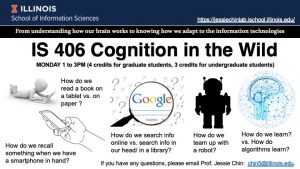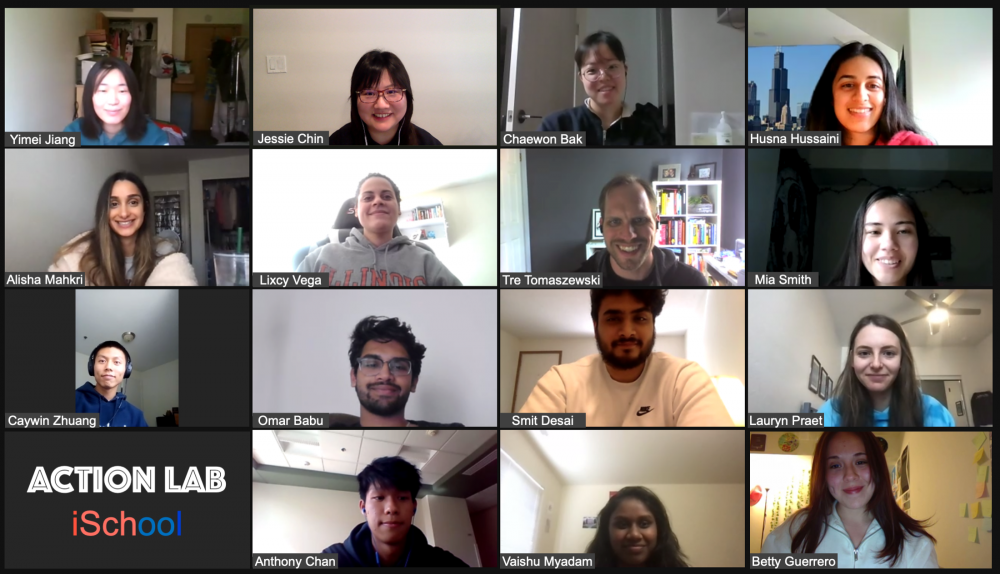Teaching
Please find the courses that I am teaching regularly. Feel free to contact me if you have any questions, chin5@illinois.edu.
New Course in Fall 2023
- IS596DIS Designing Intelligent Systems to Augment Human Performance
Given the rapid changes in information environments, emerging research has proposed and investigated the potential to leverage data sciences, artificial intelligence and computational technologies to complement, support, and augment human performance. While intelligent systems have been pervasive in our daily life, it is critical to evaluate and design these systems with solid theoretical foundations in human behavior. This course will be composed of five modules, each covering a type of intelligent system, from search, decision-making, learning, health behavior, to crowd behavior. Each module will start with the lecture on the foundation in cognitive and psychological sciences of human behavior, an analytical review on the current intelligent systems or technologies/models developed to support this behavior, and an interactive discussion on what can be done to design a system to augment human performance. This course will be composed of both lectures and discussions.
A semester-long project will be involved to develop hands-on experience in designing or analyzing intelligent systems to augment a specific human performance. No technical background is required.
Required Course
- IS504 Sociotechnical Information Systems
The character, success, and costs/benefits of information technologies are socio-technical matters. Because of this, best practice for IT design and integration relies on participants’ ability to understand and create for the totality of those settings, including social and technical dimensions. This course provides students with analytic tools for examining socio-technical settings and experience in applying that knowledge in IT modeling, design and management.- Topics we will cover: introduction to sociotechnical challenges, adaptation and rationality, moral, values and ethics in design, promises and problems in data sciences, diversity and inclusion, misinformation and regulations, law and intellectual property, user-centered and participatory design, systems modeling and cognitive work analysis, and sociotechnical issues in health informatics.
- Required course for MS Program in Information Management. Graduate students in other programs are also welcome!
Example Syllabus IS504 Fall2020
Courses in Adult Learning
Adaptive Minds and Information Overload
Starting at Osher Lifelong Learning Institute (OLLI) in Spring 2023
=====
Past Courses
Courses in Human-Computer Interaction/Applied Cognitive Science
- IS406 Cognition in the Wild
This course is designed as a foundation for students who are interested in learning how to analyze and evaluate human-centered information technologies. Students will learn basic principles in human cognition and behavior, and how these principles influence how we interact with information technologies. Students will learn how to evaluate human performance in the contemporary information environments and generate approaches to investigate research questions in the wild. The course will prepare students to translate theories in human cognition and behavior to analyze, evaluate and rethink human performance during the interactions with everyday and contemporary technologies.- Topics we will cover: Distributed cognition, information proliferation, search/decision-making/comprehension in the wild, coupling systems: memory, iInteractive behavior, misinformation, learning and algorithms, metacognition, cognitive aging, and human-automation interaction.
- Welcome undergraduate and graduate students from any programs/majors!
Example Syllabus IS406 Fall2020

Courses in Human-Centered Information Systems and Computing
- IS506 Human-Centered Information Systems
This course provides students the fundamental theory and skills necessary to design, develop, and evaluate human centered information systems. By the end of the course students will be able to gather user needs in light of existing sociotechnical systems, design effective human centered interfaces, implement interactive prototypes, and conduct unit testing and user studies of software.
- Topics we will cover: Understanding users, user analysis, user-centered design, human behavior in the contemporary information ecosystems, user research methods, prototyping, evaluating interfaces, basics in software development and evaluation, basics in mobile application design and implementation.
- This course highly emphasizes on hands-on learning. By the end of the semester, you will have six deliverables, including a case report, a user requirement report, a high-fidelity prototype, a user testing report, a unit testing report, and an interactive demo of mobile app.
- Welcome any graduate students who are interested in human-computer interaction or user experience design and research!

